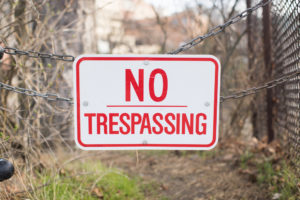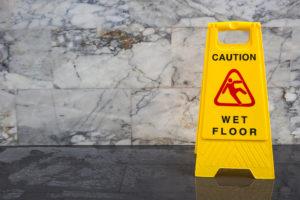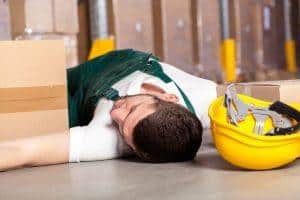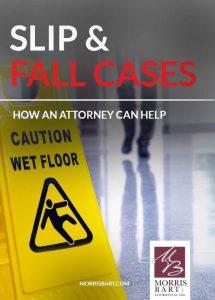
Premises liability law pertains to visitors and guests that sustain injuries while on property that belongs to an individual, business, or organization. Many people assume that a trespasser that sustains an injury while intruding onto the property of another without permission has no rights under the law, but in some situations, the property owner can be found liable depending on the circumstances. Trespassers can cause problems for a property owner; owners may unknowingly be responsible for the injuries of the trespasser if they did not uphold the duty of care that the law imposes upon them.
You May Be Liable to a Trespasser for Their Injuries
It may seem frustrating to hear that an individual that has no regard for the rules or boundaries of your property can pursue compensation against a property or landowner. While the law does not in any way encourage trespassing, it does offer some protection for these individuals.
You Owe a Duty of Care to Those Who Visit Your Property
Any person that comes onto your property, whether you invite them, they wander onto your property, or they knowingly trespass, creates certain duties of care from you to them. However, what is expected of you towards a trespasser is often different than the duty of care you must maintain when you are welcoming people into your home or land. Your knowledge of the situation will ultimately influence what duty you owe to an individual on your land, whether they are trespassing or not.
For a free legal consultation, call 800-537-8185
Did You Know the Individual Was Trespassing?
Some jurisdictions bar trespassers from seeking any recovery for injuries they sustain when illegally on the property of another. However, many jurisdictions have varying rules when a property owner will owe a trespasser a duty of care. A premises liability attorney in your area can best help you to understand the application of negligence laws regarding trespassing cases and if you might be liable to a trespasser that sustains an injury while on your property.
If You Have No Notice of the Person Trespassing
When a property or landowner has no indication or knowledge that a trespasser is on their property, their only duty of care towards the trespasser is to refrain from intentional harm. When a property owner is under no imminent threat of harm, they cannot intentionally cause harm to a trespasser or endanger their wellbeing by engaging in reckless actions. Trespassing alone does not give a property owner the right to injure or otherwise harm a trespasser.
If You Were Aware the Person Was Trespassing Onto Your Land
Depending on the laws in your jurisdiction, if you know that an individual is trespassing, and you allow them to continue to enter your property, your duty of care towards the trespasser may become the same ordinary duty of care you would owe to any other visitor of your property. Under an ordinary duty of care, you must take reasonable steps to ensure the safety of the individual and notify them of any hidden dangers that may be present on your property.
Children and Trespassing Laws
When it comes to children, trespassing laws related to negligence can be much different than when dealing with any other trespasser, depending on the laws in your state. In some jurisdictions, there is an inherent assumption that if a property has certain appealing features that attract children, a property owner must take action to protect these child trespassers from injury or harm. In many instances, the posting of warning signs is sufficient for a property owner to protect themselves, but in some locations, there may be a necessity for a property owner to take more involved action to protect the potential child trespasser.
For example, in some states, the law may require that property owners fence off areas such as a pool or other body of water that is likely to attract the interest of wandering children. When a child sustains an injury or suffers a fatality while trespassing onto the property of another, there is much more scrutiny applied to the case. A child’s age and mental capacity will play a factor in determining the liability of a property owner towards them.
Click to contact our personal injury lawyers today
How the Trespasser’s Actions Can Influence a Case
To determine negligence and liability in a premises liability case, the court and/or an insurer will evaluate the trespasser’s actions in conjunction with that of a property owner to determine liability and fault. Trespassers will almost certainly hold a percentage of accountability for their actions as it is their decision to trespass that ultimately led to their injuries. Insurers or the court will apportion fault which will determine what amount of a trespasser’s losses a property owner may be liable for.
Comparative Fault vs Contributory Negligence
Each state follows its own model to determine fault and liability when there are multiple parties responsible for the events leading up to a trespassing-related accident. Most states use some form of comparative fault or contributory negligence to determine fault in these cases.
In a comparative fault state, a trespasser might be able to pursue compensation for their losses from a property owner by subtracting the percentage of fault they are apportioned from the total damages they are seeking.
In a contributory negligence jurisdiction, the trespasser will likely be unable to seek any compensation as these states bar any recovery from a victim that had a hand in the negligent actions leading to their damages.
Contact a Premises Liability Attorney for Help
If you are facing a trespassing case where you are the owner of a property where a trespasser suffers an injury or you are an individual that sustains harm while on the property of another, you must contact a premises liability attorney near you. You can schedule a consultation for your case to discuss your legal options and rights.
Questions?Call 800-537-8185
to find a Morris Bart office near you.





